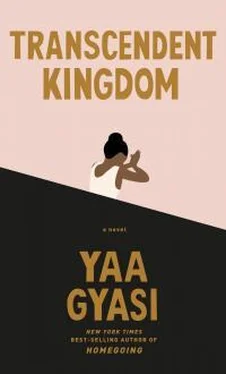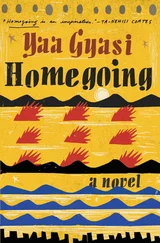“Gifty, please,” Nana hissed, turning to me for the first time. “Say something to her. I—I can’t…”
His voice trailed off and his eyes filled with tears. The sound of my name, the tenderness with which he’d spoken it, made me feel as though I’d been dunked in cold water.
Our mother packed the Tupperware into what she still called “polythene bags,” grocery bags that she collected and reused like they would run out one day. She brought the food and a suitcase into the living room and stood before us.
“We shouldn’t keep them waiting,” she said.
Nana trained his pleading eyes on me. He looked at me, and I looked away, and outside, the car horn beeped.
—
Before I started my thesis project, I had floundered a bit, trying to figure out what to do. I had ideas and impressions but I couldn’t make them coalesce, I couldn’t figure out the right question. I would waste months on one experiment, find that it led nowhere, then backtrack only to end up in the same place as before. The real problem was the fact that I didn’t want to look at the question that was staring me right in the face: desire, restraint. Though I had never been an addict, addiction, and the avoidance of it, had been running my life, and I didn’t want to give it even one more second of my time. But of course, there it was. The thing I really wanted to know. Can an animal restrain itself from pursuing a reward, especially when there is risk involved? Once I had that question figured out, everything else started to fall into place.
—
The rehab in Nashville was a thirty-day program. The facility didn’t allow visitors, but, after Nana’s detox period ended, every Friday we were allowed to call and talk to him for a few minutes. The calls were depressing. “How are you?” I would ask. “Fine,” Nana would say, and then silence would hang in the air, counting us down to the end of the phone call. It was the Chin Chin Man all over again, and I worried that this would be the way of things, that Nana and I would spend a lifetime of silent minutes, strangers on the phone.
I’m glad I didn’t get a chance to talk to Nana while he was detoxing. I don’t think I could have withstood watching him sweat out his addiction again. As it was, those sober Friday calls were enough to break my heart. Every week the sound of his voice changed. He was still angry at our mother and me, still feeling betrayed, but every week, his voice got a little clearer, a little stronger.
My mother and I drove to Nashville to pick him up on his last day there. After thirty days of shitty rehab food, he told us that all he wanted to eat was a chicken sandwich. We pulled into the nearest Chick-fil-A, and Nana and I sat at the booth while our mother ordered. Thirty days, three Friday phone calls, and we had so little to say to each other. When our mother came back with our orders, the three of us ate, making the same dull small talk we’d made before.
“How are you feeling?” my mother asked.
“Good.”
“I mean, how—”
Nana took our mother’s hand in his. “I’m good, Ma,” he said. “I’m going to stay sober. I’m focused and I really, really want to get better, okay?”
“Okay,” she said.
Has anyone ever been watched with as much intensity as a beloved family member just out of rehab? My mother and I looked at Nana as though our gazes were the only thing that would keep him there, rooted in the bright red seat, dipping waffle fries in sweet-and-sour sauce. Above his head, there was the Chick-fil-A cow urging us to “eat mor chikin.” I’d always found those ads clever, and I’d always had a strange southern pride in this place that retained its Christian values even as it grew. Years later, after my politics and religion had changed, when friends were protesting the restaurant I couldn’t make myself do it. All I could think about was that Saturday with Nana, how happy I’d felt to be with my family, to say a quick prayer of healing over our trays of fast food.
As we finished eating, Nana told us about how the staff at the rehab had taken them through morning prayers and taught them meditation. Nana was the youngest one there by a mile, and the staff had been kind and encouraging. In group therapy meetings every evening, the patients talked not simply about their troubles but also about their hopes for the future.
“What did you say?” I asked. The future was something I hadn’t allowed myself to think about for some time. While Nana was sick, our lives moved in slow motion and at great speed simultaneously, making it impossible to see what direction things might take.
“I just said that I want to get right, you know. Play basketball, spend time with y’all. That kind of thing.”
—
How does an animal restrain itself from pursuing a reward, especially when there is risk involved? By the time my mother came to stay with me in California, I had started to get a clearer picture of the answer to this question that I had been obsessing over for most of my graduate career, this test to which I had submitted many mice and many hours of my life. I’d found hints of the two different neural circuits mediating reward-seeking behavior, and I had looked at the neurons to see if there was any detectable difference in pattern. Once I’d confirmed a difference, I used calcium imaging to record the mice’s brain activity so that I could determine which of the two circuits was important to the behavior. Finally, at the end of all of this, I had almost enough information to write a paper that showed that if one were to use optogenetics to stimulate the mPFC→NAc risk-encoding cells, then, yes, it was possible to suppress reward seeking.
All of this behavior manipulation, all of this tweaking and adjusting, injecting and imaging, to find out that restraint was possible, that it could, through arduous science, be done. All of this work to try to get to the bottom of the thing that had no bottom: Nana relapsed just fourteen hours after leaving rehab.
34
Opioids work on the reward circuits of the brain. The first time you take them, your brain is so flooded with dopamine that you are left thinking that, like food, like sex, opioids are good for you, necessary for the very survival of your species. “Do it again! Do it again!” your brain tells you, but every time you listen, the drugs work a little less and demand a little more, until finally you give them everything and get nothing in return—no rush, no surge of pleasure, just a momentary relief from the misery of withdrawal.
I attended a lecture Han was giving about the process of imaging cells involved with reward expectation. The lecture hall wasn’t packed, so Han spotted me as soon as I walked in. He shot me a little wave.
I took a seat in the back as Han got started. On the projector screen, dopamine neurons spun purple with small green flashes throughout.
“The green that you’re seeing up there are the active release sites on the dopamine neurons,” Han said, using his laser pointer to indicate the spots. “The mesocortical, mesolimbic, and nigrostriatal dopamine pathways are what we call the reward pathways, all right? They’re the ones that activate when we’re expecting or receiving a reward.”
Han scanned the room, and I gave him a thumbs-up when his eyes landed on me. He grinned, then coughed to cover up the grin. He continued lecturing, and I looked around the room. Ambitious undergrads mostly, attending a midday neuroscience lecture perhaps for class credit, or perhaps because they wanted to pursue a career in the field, or perhaps just out of plain old curiosity.
When Han finally finished, I waited for the room to clear. I sat in my seat as he started shuffling the papers on his desk. I raised my hand, but he wasn’t looking at me so I cleared my throat loudly. “Excuse me, Professor?” I said.
Читать дальше












